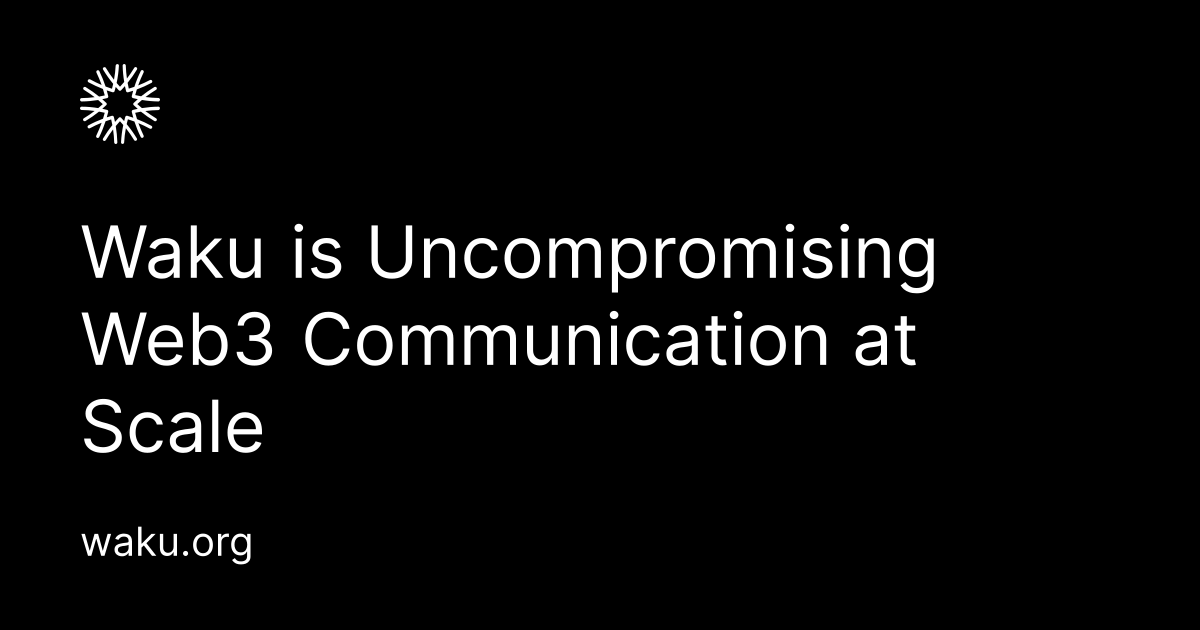Building decentralized applications today means dealing with a fundamental problem: how do you enable real-time communication without relying on centralized servers? Traditional messaging solutions force you to choose between decentralization and performance, but Waku changes that equation entirely. It’s a family of robust, censorship-resistant, peer-to-peer communication protocols designed specifically for Web3 applications. It's not just another messaging protocol, it’s a complete communication infrastructure that lets you build truly decentralized applications without compromising on security, privacy, or user experience.
Understanding what Waku isn't
Before diving into what Waku can do, it's important to understand what it's not:
Not a blockchain: Waku operates independently, so you don’t pay gas fees for every message.
Not just for chat apps: It handles more than text — it's suitable for complex dApp interactions.
Not for long-term storage: It's designed for real-time, ephemeral messaging. For persistence, use it alongside IPFS or databases.
Real-world applications
Waku is useful across many areas of Web3. It allows developers to build private chat apps and social platforms that can’t be censored or shut down. Messages move through a peer-to-peer network, making communication secure and reliable without needing central servers.
It also helps reduce gas fees by moving actions like voting, NFT bidding, and Layer 2 coordination off-chain. In finance, Waku can handle multi-signature approvals and state channel updates privately. For gaming, it supports fast, peer-to-peer communication so developers can build real-time games without relying on centralized systems.
Getting started with Waku
Run your own node or integrate it using SDKs.
Use @waku/sdk for JavaScript/TypeScript.
For React apps, use @waku/react.
Start quickly with @waku/create-app, which includes example templates.
Development resources and community
Waku offers strong learning and collaboration support:
Official documentation covers everything from basics to advanced topics.
YouTube tutorials and the Waku blog provide visual and written guidance.
For help or contributions:
Join the Discord community.
Explore or contribute on GitHub.
Looking for ideas or examples?
Examples site: See real Waku-based apps.
Awesome Waku: A curated resource list.
Why Waku matters for Web3
Waku solves key challenges that limit decentralized applications. Its peer-to-peer network has no central point of failure, so your app keeps working even when nodes go offline. There’s no central server, so communication cannot be blocked or censored.
Waku also protects privacy with end-to-end encryption and metadata protection. It avoids gas costs by operating off-chain. With SDKs, great docs, and active community support, Waku is developer-friendly and flexible for any Web3 use case.
Conclusion
Waku brings essential communication infrastructure to the decentralized web. It removes the trade-offs between privacy, decentralization, and usability that most developers face. Whether you're building messaging, coordination, finance, or gaming dApps, Waku gives you the flexibility and performance to do it right. With strong community backing, plug-and-play SDKs, and open tools, Waku makes it easier than ever to integrate censorship-resistant, secure, and scalable messaging into Web3 projects.


